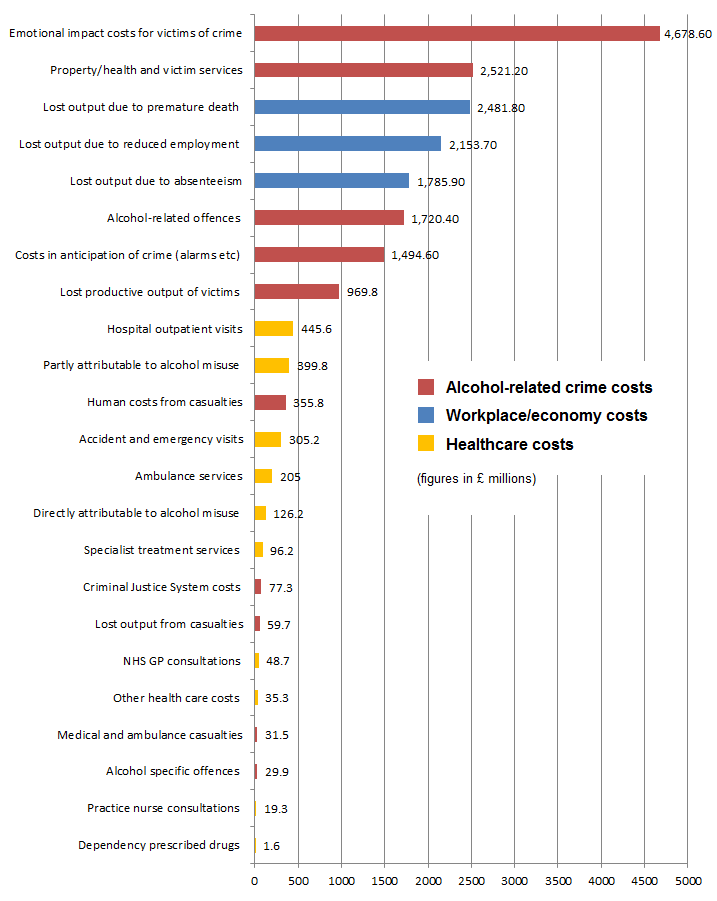Does Britain lose £21 billion to alcohol abuse each year?
"Society is paying the costs — alcohol-related harm is now estimated to cost society £21 billion annually."
David Cameron, The Government's Alcohol Strategy, 23 March 2012
After a difficult week for the Government following the Budget 2012 announcement, the media's attention today turned to alcohol costs.
The Government's Alcohol Strategy follows a move towards fixing a minimum price per unit of alcohol, though no specific price has yet been set. The societal cost of alcohol can be measured in a number of ways and, as a Department of Health spokesman said, a lot of figures are 'bandied about' at times like these.
Join 72,953 people who trust us to check the facts
Sign up to get weekly updates on politics, immigration, health and more.
Subscribe to weekly email newsletters from Full Fact for updates on politics, immigration, health and more. Our fact checks are free to read but not to produce, so you will also get occasional emails about fundraising and other ways you can help. You can unsubscribe at any time. For more information about how we use your data see our Privacy Policy.
So does this one represent reality?
Analysis
Searching for the closest estimates brings up a 2003 report from the now defunct Cabinet Strategy Unit which sets the figure at £20 billion — very close to the £21 billion being quoted today.
It breaks the costs down into three categories:
1) "costs borne by the taxpayers arising from the excess use of health services"
2) "costs of injury to third parties from alcohol related motor accidents or crime incidents"
3) "costs due to lost productive output".
It also provides a useful breakdown of what these costs actually are, many of which could have made headlines in themselves at the time:

Overall the healthcare costs comprise 8.3 per cent of the total, workplace and wider economy costs 32 per cent and 59.5 per cent comes from alcohol-related and alcohol-specific crime. The data is impressively detailed and is backed up by numerous references, but if you look a little closer there are some unusual categories.
Ambulance services are listed under healthcare costs, but medical and ambulance costs also crop up under the crime-related costs of drink-driving. There are several plausible explanations, but none we could confirm, since the report's writers seem to have disappeared into the ether along with the Strategy Unit.
Since 2003 the document's data seems to have been changed in parts by different Government departments. The healthcare measures bear a smiliarity with more recent estimates of healthcare costs covered in a previous factcheck:
Full Fact asked the Department of Health (DH) if the data from 2003 was the source of the £21 billion claim and, if so, where the extra billion over the last decade came from. They didn't have the full details, but this is likely anyway to be due to the DH's increased estimates.
Further evidence can be found in a more recent report still. Signed off by Work and Pensions Secretary Iain Duncan Smith, the 'State of the nation report: poverty, worklessness and welfare dependency' in the UK from 2010 said costs to society were estimated at between £17 billion and £22 billion.
It explained that they had assistance from the Home Office and Department of Health to update the 2003 estimates, with: "costs from disorder and crime between £8 billion and £13 billion, unemployment and workplace sickness £6.4 billion and NHS costs £2.7 billion."
Conclusion
The updates apparently provided by the Home Office and Department of Health to the 2003 data place the estimated costs close to the amount that Mr Cameron was using today.
However, the analysis is now almost a decade old, and has been added to bit by bit from different sources. Neither the Home Office nor the Department of Health were able to explain properly where the figures were from, and there is no obvious single point of contact to verify the original calculations.
Without more explanation as to how the original data was compiled, and what some of the categories actually mean, we do not feel able to rely upon the £21 billion cost figure.